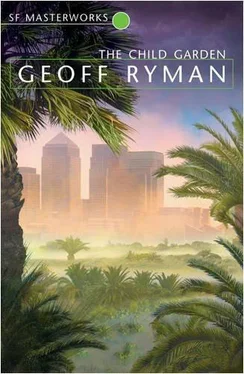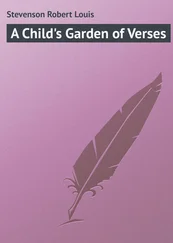‘What Estate will I be near?’ Milena asked him. She already knew, but she wanted to see his response.
‘Oh, Lady,’ he said embarrassed. He was still smiling but he looked down. ‘You are Tarty.’
‘But that is not an Estate. Will I be near the Slump?
He shook his head. ‘No. You will be near the Estate of Remembrance.’
He was wincing. He looked away. Remembrance was a euphemism for Death.
The new Tarty flats had a social purpose. They were there to plant Party Members out in the Slump. They were also there to raise the social standing of a necessary but shunned Estate.
The punt moved on, round the edge of L’Etoile.
On the horizon there were now blue hills, striped by paddies. The border of reeds beside the channel grew narrower. Milena could see banks of earth, their edges white with dried salt. There was a sudden thundering of hooves.
White horses galloped alongside the lake, silver manes tossed, great heavy feet pounding the sandy earth and the thick salty grasses.
‘Oh!’ said Milena, in admiration. It was here that the huge but nimble carthorses were bred, it was here that they ran free when young, and they came back here twice a year to run free again. On their backs the Horseboys and Horsegirls rode, in thick leather chaps that were carved in tattoo shapes.
‘Ai-ai-ai-ai-AIIII!’ shouted Milena’s punter, to them, all excited. The Horseboys ignored him. ‘Ach,’ he said in envy, and clicked his tongue. ‘They are the ones. They are the ones.’
A young girl ran beside the leading horse. She caught hold of the mane, and seemed to bounce twice before suddenly launching herself up onto its back. She leaned forward, her mouth in the horse’s ear. The stallion turned, and the whole herd turned with it, dipping suddenly down and out of sight behind the sandy rise.
‘Oh!’ sighed the boy. ‘That is where I want to be Placed. I want to ride horses, not boats.’ He smiled, but with sadness.
They moved out of L’Etoile into a narrow channel. From somewhere ahead of them came a clinking sound, like coins. The sound deepened as they approached, and as they came round a bend, Milena saw a long bamboo arm, trawling over the surface of the water. Buckets were hoisted out of the water, wobbling with weight and trailing black sludge. The buckets were then hoisted by a tiny, noisy engine onto the shore. Men snatched the buckets and emptied them, pouring slurry into pits. Their legs were glossy with mud; their cotton shorts and shirts clung to them.
A row of beehive-shaped kilns gradually came into view, smoking, adding to the haze of the air. There was a delicious scent of burning wood.
It was a temporary camp of brickmakers. Rows of young children squatted, cotton over their faces. They patted paste into brick moulds. The paste was Thames mud, a mixture of earth and clay and ash and the chewed up rubble of flooded buildings. Skinny people, the colour of the dried dust, carried shovels of brick to the kilns. Milena could feel the heat of the kilns on her face. ‘Tarty! Tarty woman!’ they all called and waved to her, with perfect, white smiles. Milena waved back.
The narrow channel led to a vast, flat area of rice as far as Milena could see. It basked in water and sunlight. There were flags marking fish-farms. There were houses at regular intervals, standing high over the rice and the water on pillars of bound bamboo. Lines of laundry hung from the porches. Children scrubbed clothes on pans on their laps. There were walkways, rope bridges slung between the houses. A man lay flat on his roof, swiping at a stork with a cane. The bird lifted its wings in anger, and would not be moved. Women and Tykes looked up at him smiling, teasing him. Milena clapped her hands once, sharply, and suddenly the bird took off. There was cheering and applause. The man waved sheepishly, still clinging in fear to his roof.
The punt glided past fields of giant lotus, the huge blossoms closed against the sun. The flat round leaves were large enough for the child-farmers to walk on quite safely. Coots walked beside them without fear.
There were mud ponds, full of children and adults running, knee-deep calling to each other and laughing with glee. They were chasing eels. Trout sweltered in ponds behind cages of water wood. There were salt-rimmed ponds in the banks where frogs were farmed. Shepherd children watched them, protecting them against marauding herons. Wet dogs, black and white collies, barked and chased the livestock. Milena saw one scoop up a frog in its jaws and trot back to the pond. The dog splashed far out in the middle of the pond, before gently letting the frog go free. Out to the horizon there were houses high on stakes, and walkways, and floating artificial islands, rising and falling as if with breath. There were boats everywhere, people everywhere, inspecting the plants, parching the reeds, drying translucent panels of rice paste.
Finally they came to the Slump itself.
Great mounds of it rose above the waterline in perfect domes. Deer grazed on the roofs, boats were pulled up onto its banks. Smoke drifted out of it.
The Slump was a kind of fungus, rich in protein, that was farmed on the saltier reaches of the estuary. The Slump Bobbers lived inside it. They shovelled out courtyards and chambers, cooking and sleeping inside their crop until it began to go soft and ripe.
On the top of the nearest dome, someone was bobbing. Not in a hurry, the man walked with a lazy, sauntering bounce. He carried something in a basket on his head. Rising up over the edge of the dome came eager children. They bounded across the Slump, as if on the surface of a trampoline. The man turned, annoyed, and perhaps said something. The Bobber children trembled to a halt, their knees suddenly absorbing all the bounce, their shoulders staying level.
The punt moved on, and Milena saw that a small paddle steamer was anchored beside the Slump. The Bobbers were out with their sharp-bladed shovels, cutting the Slump, peeling it up in layers, and loading it into barrows. They ran up the ramps on the boat, and tipped the barrows up and sent the fungus cascading onto the steamer.
Ahead of them there was thick black smoke streaming up in rows from many, many kilns, all along the horizon, as if the sky were on fire.
The boy reached into the top of his wrappings and pulled out a cloth. He tied it over his face. Milena began to hear an almost tuneful, hollow, clattering sound. There was wailing.
‘Remembrance,’ said the boy. He passed her a mask.
The kilns were irregular towers of red, baked soil, surrounded by bundles of reed for fuel. People in black scuttled up and down them, carrying reeds on their backs. The kilns seemed to stand on an island of pink and white. As they drew closer, Milena began to think it must be flowers, lotus blossoms or lilies. Is it a flower farm? she wondered.
Then she saw that the flowers were festooned on canoes. She began to hear a formless chorus of singing, a low, deep mournful sound of many different songs being sung at once. Up the sides of the fifty kilns, up each of them, stood hooded people in white. Between them they carried hammocks on long poles. The hammocks sagged with a dead weight.
One a minute, her viruses told her, they are disposing of one every minute. Two hundred, three hundred boats full of mourners, the viruses told her at a glance. The boats seemed to rise and fall with the sound of dirges.
Their boat had to pass between them.
Women sat in boats rocking quietly. Young men craned their necks to see how many boats were still ahead of them. Everyone wore white, including those who seemed to be asleep, their faces collapsed into themselves, their lips blue and prim. Shadows from the smoke drifted over them. Smut settled on the white shirts and jackets.
Читать дальше












